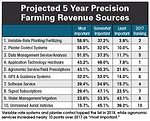Advertise Follow Us
Precision Farming Dealer

View Archived Issues
Summer 2018
Volume: 6
Edition: 2
2018 Benchmark Study: Positive Projections for Precision Revenue
-
Table of Contents
Table of Contents
2018 Benchmark StudyPositive Projections for Precision Revenue
Dealers report exceeding 2017 growth projections and two-thirds project measurable increases in 2018, with one-quarter forecasting jump of at least 8%.Read More2018 Benchmark StudySelling Service Value, Not a One-and-Done Customer
Independent service revenue objectives continue trending up as supporting wholegoods with technology sales and hardware reliance dip.Read More2018 Benchmark StudyBoosting Agronomic Revenue & Customer Retention
Scope and structure of billing out precision services continues to evolve as more dealers opt for agronomy-focused offerings and a per-acre charge.Read More2018 Benchmark StudyTraining, Service Growth Remain Top Dealer Priorities
Customer education, employee stability and expansion of support revenue are primary targets to increase revenue now and in the future.Read MoreDay in the CabEmbracing Customer Diversity Delivers Customized Service Solutions
A problem-solving mentality, persistence and patience are service principles Devyn Van Camp brings to the job as Integrated Solutions consultant with Riesterer & Schnell.Read MorePrecision Training & Service: Roll In? Or Line Item It?
Three precision managers answer how to protect the service package plan on new machines from the farmer unenthused about extra costs.Read More8 Tips for Building Better Dealer-Farmer Precision Partnerships
Three farmers and three precision equipment specialists discuss strategies for anticipating service needs, maximizing sales opportunities and avoiding customer conflict.Read MoreCompatibility Conversation: Setting Aside Competitive Differences to Achieve Plug & Play Outcomes
Tech engineering veterans trade cautionary tales and share optimism that the transition to high-speed ISOBUS connectivity can improve applied prescriptions, data logging and cost-effective controls on farm machinery.Read More -
Featured Articles
Featured Articles
2018 Benchmark StudyPositive Projections for Precision Revenue
Dealers report exceeding 2017 growth projections and two-thirds project measurable increases in 2018, with one-quarter forecasting jump of at least 8%.Read More2018 Benchmark StudySelling Service Value, Not a One-and-Done Customer
Independent service revenue objectives continue trending up as supporting wholegoods with technology sales and hardware reliance dip.Read More2018 Benchmark StudyBoosting Agronomic Revenue & Customer Retention
Scope and structure of billing out precision services continues to evolve as more dealers opt for agronomy-focused offerings and a per-acre charge.Read More -
Digital Edition
Digital Edition












![[Technology Corner] Discussing AI’s Potential Impact on Service & Support](https://www.precisionfarmingdealer.com/ext/resources/2025/04/11/Discussing-AIs-Potential-Impact-on-Service--Support.png?height=290&t=1744385717&width=400)


